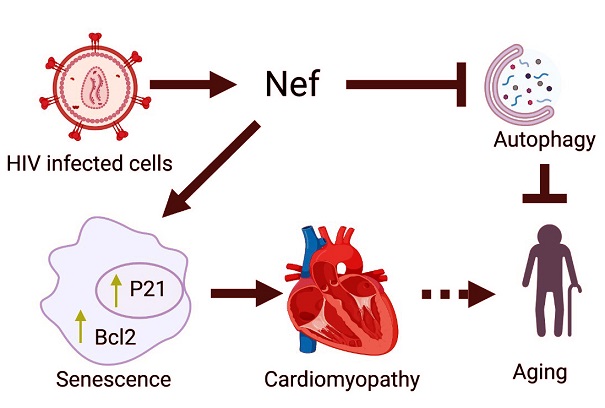Nikhil Prasad Fact checked by:Thailand Medical News Team Oct 25, 2024 1 year, 3 months, 2 weeks, 5 days, 12 hours, 2 minutes ago
HIV News: A new study reveals that a protein produced by the HIV virus, called Nef, could be contributing to heart disease in people living with HIV, even when they are on antiretroviral therapy (ART). Researchers from the University of Central Florida - USA and Tulane National Primate Research Center -USA explored how the HIV Nef protein affects heart function. The study offers valuable insights into why people living with HIV face higher risks of heart disease, despite advancements in ART. This
HIV News report dives into the key findings and their implications.
 Graphical Abstract: HIV Protein Nef Linked to Heart Disease
Understanding the Study
Graphical Abstract: HIV Protein Nef Linked to Heart Disease
Understanding the Study
HIV has long been associated with various health complications, but the connection between the virus and cardiovascular diseases is less understood. This new study set out to investigate how HIV’s Nef protein impacts the heart. Nef, a viral protein crucial for HIV’s survival and spread, can be found in various organs, including the heart, even in patients receiving ART. Researchers sought to determine whether Nef could directly contribute to heart problems, and their findings have significant implications for both HIV treatment and cardiovascular health.
What the Study Discovered
The researchers created a special mouse model to study the effects of Nef. These mice were genetically engineered to express Nef specifically in their heart tissues, mimicking the condition of HIV patients. By doing this, the researchers were able to closely monitor how the protein affected heart function.
Their findings were concerning. The mice with Nef in their heart tissues developed significant heart problems. These included:
-Enlarged hearts: The Nef-expressing mice showed heart enlargement, a condition known as cardiac hypertrophy, which can lead to heart failure if untreated.
-Increased fibrosis: Fibrosis refers to the thickening and scarring of connective tissue. The researchers found more fibrotic tissue in the hearts of the Nef-expressing mice compared to normal mice, indicating that the protein caused significant heart damage.
-Decreased heart function: The Nef mice had reduced fractional shortening, a measure of how well the heart contracts. This suggests that their hearts were not pumping blood as efficiently as they should.
The heart problems in these mice closely resemble conditions seen in humans with cardiovascular disease, suggesting that Nef might be responsible for some of the heart issues experienced by people living with HIV.
How Nef Affects the Heart
The study revealed that the Nef protein interferes with several critical cellular processes in the heart, particularly autophagy and cell survival pathways.
-Autophagy inhibition: Autophagy is a natural process that helps cells remove damaged components and maintain their health. The re
searchers found that Nef disrupts autophagy by increasing the levels of certain proteins, including Bcl2 and Beclin-1. By interfering with autophagy, Nef contributes to the build-up of damaged cells in the heart, leading to fibrosis and heart failure.
-Promotion of cellular aging: The study also revealed that Nef triggers cellular aging, or senescence, in heart cells. One key marker of this process is the protein p21, which was found to be elevated in the Nef-expressing mice. Senescence prevents cells from dividing and functioning normally, which in turn contributes to organ dysfunction and disease. The presence of senescence markers like p21 suggests that Nef might be accelerating heart aging in people with HIV, leading to earlier onset of cardiovascular disease.
Implications for People Living with HIV
The findings of this study are particularly important for people living with HIV, especially those who are on ART. While ART has been incredibly successful in managing HIV infection and improving life expectancy, it doesn’t completely remove all HIV proteins from the body. Proteins like Nef can still be found in various organs, where they may cause damage, even when the virus itself is controlled.
The discovery that Nef can contribute to heart disease adds a new layer of complexity to HIV treatment. While current therapies are effective at reducing the viral load in the blood, they may not prevent the long-term damage caused by viral proteins in other parts of the body, such as the heart. This highlights the need for treatments that target these viral proteins directly, in addition to the standard ART.
The Study's Broader Impact
The researchers believe that their findings will have far-reaching implications. The Nef-transgenic mouse model they created offers a new way to study how HIV affects the body, beyond just its impact on the immune system. By understanding how Nef contributes to heart disease, researchers can begin to explore potential therapies that might mitigate this damage.
For example, drugs that boost autophagy could potentially counteract the harmful effects of Nef on the heart. Additionally, treatments aimed at reducing fibrosis or preventing cellular aging might help improve heart health in people living with HIV.
Conclusion
This study provides valuable insights into how HIV continues to impact the health of people living with the virus, even when they are receiving ART. The discovery that Nef can cause heart enlargement, fibrosis, and reduced heart function suggests that HIV patients need to be closely monitored for signs of cardiovascular disease, even if their viral load is under control.
Moreover, the study highlights the importance of developing new therapies that target viral proteins like Nef, which remain in the body despite ART. By addressing these lingering effects of HIV, it may be possible to further improve the health and longevity of people living with the virus.
The study findings were published in the peer-reviewed International Journal of Molecular Sciences.
https://www.mdpi.com/1422-0067/25/21/11401
For the latest
HIV News, keep on logging to Thailand Medical News.
Read Also:
https://www.thailandmedical.news/news/atherosclerosis-and-cardiovascular-risk-in-people-living-with-hiv
https://www.thailandmedical.news/news/new-insights-into-how-hiv-disrupts-autophagy-and-impacts-heart-health
